
By Anne M Kletcha
Deep in the grubby sump of one of those so-called ‘Social Media’ sites, there is a clump of aging comics fanboys called The Really Very Serious Alan Moore Scholars’ Group, known to its sad and lonely adherents as TRVSAMSG. When they’re not annotating everything in sight, or calling down ancient evils on the heads of everyone who ever said anything mean about WATCHMEN, their sacred text, they occasionally get to send questions to His Celestial Being. Here’s a second selection from the twenty-five questions they invoked in December 2015, this time on the loose subject of things He likes. Note that some questioners were afraid to direct questions directly to The Magus, for fear of evoking His righteous wrath, and addressed Him in the third person.
Part I is here, True Believers! Now read on…
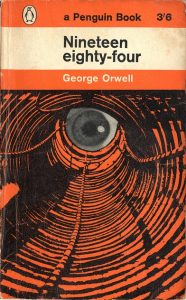
Moorean Zealot #6: What does He think of NINETEEN EIGHTY-FOUR? And what are His favourite Science Fiction novels?
Alan Moore: Well, NINETEEN EIGHTY-FOUR the year was the year that, with the commencement of WATCHMEN, I was entering into my own totalitarian nightmare that would, of course, end with my head in a cage with a starving rat, or some other appropriate metaphor for the movie and the prequels. NINETEEN EIGHTY-FOUR the book was thus a much cheerier proposition, and I’ve been a huge admirer of it since I first read it as a fifteen or sixteen year-old. For a while I thought that [George] Orwell’s suggestion that we would be brutalised into submission, the stick, seemed less likely than [Aldous] Huxley’s proposal, in BRAVE NEW WORLD, that we would be led willingly into slavery by the carrot of drugs and games and entertainments. Of course, since the May [2015] elections I’ve realised that there’s no reason why an administration shouldn’t use both at once by beating us to death with a gigantic carrot, which probably has all nails sticking out of it and everything. So, George, Aldous, there’s no need to squabble: you’re both right. No, it was a wonderful book, and it proved very useful in filling in some interesting post-WWII parallel world history in THE BLACK DOSSIER. We were even able to explore Orwell’s implication – Airstrip One is clearly dominated by America and has the dollar as a currency, but is just as clearly a communist state – that the USA itself, after the war, has become a communist country. Jess Nevins dug up some Soviet S.F. with a wistful, utopian story in which a communist with the endearing name of Mike Thingmaker becomes America’s President, which we able to reference in LEAGUE 1969 by way of a mash-up with Robert Thom’s WILD IN THE STREETS.
As for your question about my favourite S.F. novel, I think I’ve said elsewhere that I have real difficulties in thinking about things in terms of favourites, and that any book upon which I did confer that status would have probably been deposed by five minutes more thought. What would probably be more useful – if I may presume – is to give a list of various books that I really like, and to do my best to only name books or authors that were neglected the last time I compiled such a list, which was a couple of weeks ago.
In September 2015, in an online Goodreads interview, Moore was asked ‘What is your favorite science-fiction novel of all-time?’ He answered:
‘
I don’t tend to think in terms of favourites, as that would make my otherwise enjoyable tastes in relaxation into something of a competition. A (very) brief and changeable list of recommendations, in no particular order, would be Mike Moorcock‘s Cornelius quartet, Walter Miller‘s A Canticle for Leibowitz, John Sladek‘s The Müller-Fokker Effect, Brian Aldiss‘ Hothouse (one of the first science fiction novels I ever read), [Alfred] Bester‘s The Stars My Destination, Mike Harrison‘s The Machine in Shaft Ten, [JG] Ballard‘s The Unlimited Dream Company, Phillip Bedford Robinson‘s Masque of a Savage Mandarin, Samuel Delany‘s Dhalgren, [Harlan] Ellison‘s short stories, Judith Merrill‘s anthologies, [Thomas M] Disch‘s Camp Concentration, [Norman] Spinrad‘s Iron Dream, anything by Steve Aylett, and so on, potentially, forever.’
[End of the foregoing]
So, in no particular order, how about IN WATERMELON SUGAR by Richard Brautigan with its writing like pieces of coloured glass; absolutely any book at all by the marvellous and ingenious Barrington Bailey, but especially his short stories and a special recommendation for ‘Sporting with the Chid’ as a striking introduction to his wildly various world; similarly, anything by the [GK] Chesterton-influenced R.A. Lafferty… THE REEFS OF SPACE, NINE HUNDRED GRANDMOTHERS, FOURTH MANSIONS …for a near-psychedelic tour through a very odd and inventive mind; the work of former OSS operative Paul S. Linebarger under the name Cordwainer Smith for its odd poetry and the suspicion that often his stories were created around their captivating titles like ‘Drunkboat’ or ‘The Dead Lady of Clown Town;’ a special mention for Linebarger’s fellow sometime-spook on this side of the Atlantic, Eric 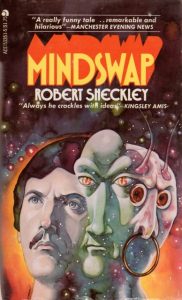
An Additional MZ Asked: Here at the end of the glorious question-a-day cycle, I thought of a new question, which was about his reading habits. One can work out WHAT he likes to read, but when? Where? How much at a time? Et cetera. There should be a whole site devoted to the bits of a given author’s life as a READER.
A Source Close to Mr Moore Answered: I’ll sneak in and give a brief factual answer, although it will lack the length, depth and timbre of the genuine article: he reads compulsively. He has a 50-year-strong book habit, and I’ve seen his hand genuinely twitch towards books near him as the kind of impulse gesture you might normally associate with the methadone queue at the local chemist. His house is lined, insulated, and possible mostly structurally supported by books; he sits in an armchair in a corner by the fire, and is usually physically surrounded by towers of books and magazines. The magazines (New Scientist, Fortean Times, Private Eye) he reads casually – by which I mean whenever he doesn’t have a book in his hand and to ease the reading-jitters while he’s eating, drinking, or talking to people. The rest of the time he is either writing, out of the house, sleeping, or reading books. When he started researching PROVIDENCE, I visited and physically could not see his armchair, the stack he was hidden behind was over 3 feet high and at least 2 rows deep. I took a picture at the time, I’ll see if I can find it and ask him if he minds me posting it.
To finish, the manner of his reading could be best summed up if you picture a vulture stooped over carrion. Of necessity he holds his victim about 5 inches from his good eye, and consumes them with an intensity which varies from cartoon-character-eatingcorn-with-old-fashioned-typewriter-sound-effects, to laser-beam-eyes-with-buzzsaw/wood-chipper-sound-effects; both of which leave the impression he’ll have either inadvertently shredded the pages, or just left them blank having sucked all the words off with his eyes. What I find most alarming, is that he can also remember almost all of almost all of them.
MZ #7: In last year’s missive to the group you mentioned really enjoying some of the work of Kieron Gillen. As a fellow Gillen fan, what do you think he brings to the form that’s so invigorating?
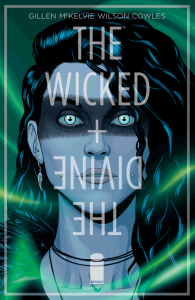
MZ #8: Courtesy of this interview, we’ve come to discover you have quite the collection of old punk rock records. So, which was your favourite, and how do you explain the continued appeal of that period of music that was only ever meant to be a temporary snarl at the culture establishment?
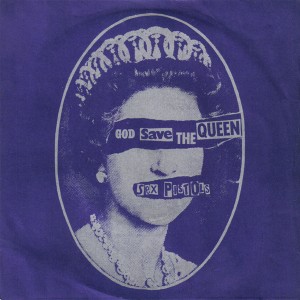
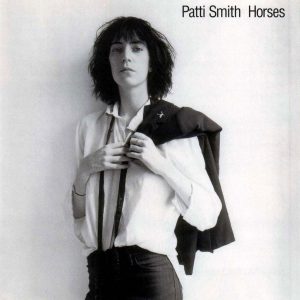
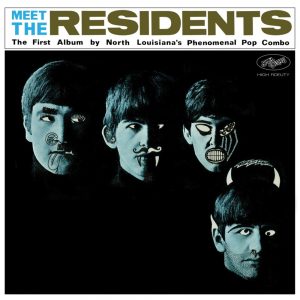
I suppose the neatest thing would be to conclude with the pride of my late 70s single collection, which would be the legendary Stiff 9, which was “England’s Glory”, with “Dream Tobacco” on the flip-side, by the authentic genius Max Wall, assisted by Ian Dury and various Blockheads. “England’s Glory” is such a good song. I remember talking with Bill Bragg, when he was looking for ways to articulate English identity, and I suggested “Nice bit of kipper, and Jack the Ripper, and Upton Park/ Gracie and Cilla and Maxie Miller; Petula Clarke!” Bill agreed that “England’s Glory” was certainly a good start in defining national identity, although I think we both knew that whatever manifesto was ended up with probably wouldn’t rhyme, or be as endearingly funny. As for your question about the continuing appeal of punk, I’d say that we could afford to think of youth movements as temporary, ephemeral and throwaway phenomena, back when we still thought there’d be another one along in a year or two. The last time this happened – seriously, you really should read John Higgs’ KLF : CHAOS, MAGIC, AND THE BAND THAT BURNED A MILLION QUID, and not just because there’s a particularly sexually attractive photo of me in there, although of course that never hurts – was with the end of Rave in around, say, 1990, following which there was a weird interregnum where nothing seemed to be happening on the music/youth-cult front until 1995, when we get that herald of Tony Blair and New Labour, the Britpop movement, not a real movement grown from the street up, but a non-threatening, non-political pseudo-movement imposed from the top down, processed cultural food reconstituted from the offal and leftovers of the previous thirty years of English guitar bands (I am of course exempting Jarvis Cocker and Pulp from the above.) To answer your question, I think we really didn’t realise how lucky we were until we had all our counter cultures taken away from us, and that we might well look back on punk music, psychedelic music, Mod music, Protest-Folk music and all the other movements with longing and a continued fascination in what was very possibly the last authentic British musical culture of our times, before that institution was apparently subcontracted out to Simon Cowell.
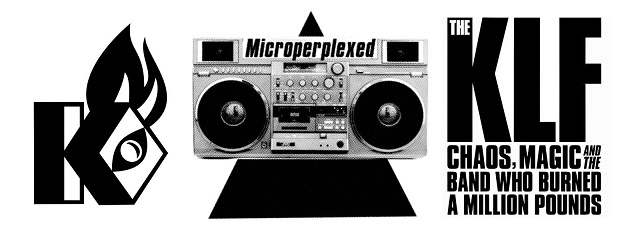
MZ #9: Does he write with a Fountain Pen or have any special writing implements or have a favourite type of pen?

Alan Moore: Oh, dear. This is going to be a massive disappointment, I know, and I wish I had the time and inspiration to just invent a mythic writing implement worthy of entering legend with me, like Thor’s hammer or Dionysus’ six-pack of Stella Artois or Pharrell Williams’ scouting accessories. If I could, believe me, I’d confess that I was unable to write a word without a sharpened quill plucked from the last Archaeopteryx and then dipped in the black, palpitating heart of Tragedy itself, which even to me sounds like the sort of thing I might use for a inkwell. As it is, however, there is a sort of desk-tidy thing like a Teflon jam-jar by the side of the chair I sit and write in that is apparently the fabled biros’ graveyard, where the world’s cheap and worthless ballpoint pens drag themselves as if according to some primordial instinct when they are no longer the slightest bit of good to man, beast or even feeble trainee poltergeist. This is why my every working day commences with an indefinitely protracted loop of impatient scribbling sounds and the phrase, “Oh, for fuck’s sake.” (Please don’t everybody send me pens. I have been given fine fountain pens, but they make me feel alternately pretentious and intimidated. I did have a Man from U.N.C.L.E. fountain pen once, with invisible ink cartridges so that I could pretend to be a spy. I was twenty-eight years old.) Now, if you’d been a bit more modern, up-to-the-minute and generally high-tech such as I am myself, you might have asked me whether I had a special keyboard that I liked to use for my typing, in which case the answer would have been much more positive. I’m typing this on a keyboard that Joe Brown found for me a couple of years ago – during which time I would quite easily have got through four or five of the ordinary, simpering “Oh, we’re delicate! Oh, don’t partially melt us and fill us with hair and drugs or we’ll faint or something” type of keyboards. My current model is made out of stainless steel and is designed for use in a heavy-duty industrial environment, where it claims to be able to withstand showers of molten metal or cinders, and also the combined force of pressure hoses turned upon it from all four directions at once – yeah, that isn’t a problem which arises that often, but you never know, do you? (This is actually true, by the way, although I realise I may have eroded your trust in my honesty with my continual Eddie Izzard flights of whimsy/pathological lying.) Anyway, after about two months one or two letters were sticking and one of the shift keys was no longer responding. Is it necessarily a sign of immaturity if I confess that I felt quietly proud of myself?
A source close to Mr Moore added: I might send him a biro for Xmas – I’ve been struggling with gift ideas. I can attest the truth of all of the above; If memory serves, he did once put his finger at least partially through a keyboard… He types two-fingered and as if he is extremely angry with the keys. Next time I’m in Northampton, I should record a few seconds of the sound of his typing; it’s incredible.

When she’s not scrapbooking, catching strange fish for her dinner, or writing her book, she talks to fellow literati all over the world via the wonders of the Internet. She has never met Alan Moore, but has plans. Oh yes.


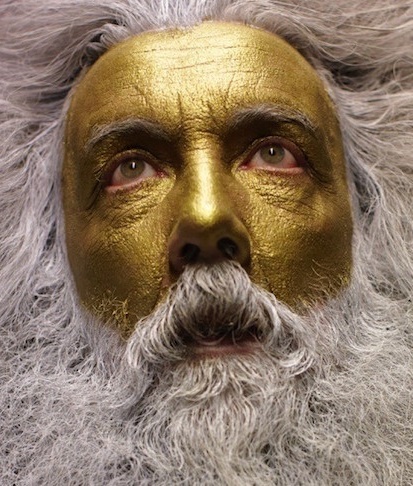
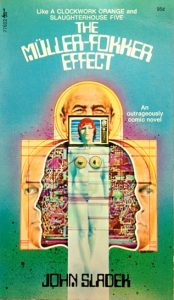 I don’t tend to think in terms of favourites, as that would make my otherwise enjoyable tastes in relaxation into something of a competition. A (very) brief and changeable list of recommendations, in no particular order, would be Mike Moorcock‘s Cornelius quartet, Walter Miller‘s A Canticle for Leibowitz, John Sladek‘s The Müller-Fokker Effect, Brian Aldiss‘ Hothouse (one of the first science fiction novels I ever read), [Alfred] Bester‘s The Stars My Destination, Mike Harrison‘s The Machine in Shaft Ten, [JG] Ballard‘s The Unlimited Dream Company, Phillip Bedford Robinson‘s Masque of a Savage Mandarin, Samuel Delany‘s Dhalgren, [Harlan] Ellison‘s short stories, Judith Merrill‘s anthologies, [Thomas M] Disch‘s Camp Concentration, [Norman] Spinrad‘s Iron Dream, anything by Steve Aylett, and so on, potentially, forever.’
I don’t tend to think in terms of favourites, as that would make my otherwise enjoyable tastes in relaxation into something of a competition. A (very) brief and changeable list of recommendations, in no particular order, would be Mike Moorcock‘s Cornelius quartet, Walter Miller‘s A Canticle for Leibowitz, John Sladek‘s The Müller-Fokker Effect, Brian Aldiss‘ Hothouse (one of the first science fiction novels I ever read), [Alfred] Bester‘s The Stars My Destination, Mike Harrison‘s The Machine in Shaft Ten, [JG] Ballard‘s The Unlimited Dream Company, Phillip Bedford Robinson‘s Masque of a Savage Mandarin, Samuel Delany‘s Dhalgren, [Harlan] Ellison‘s short stories, Judith Merrill‘s anthologies, [Thomas M] Disch‘s Camp Concentration, [Norman] Spinrad‘s Iron Dream, anything by Steve Aylett, and so on, potentially, forever.’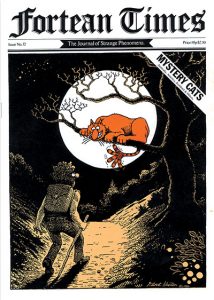 A Source Close to Mr Moore Answered: I’ll sneak in and give a brief factual answer, although it will lack the length, depth and timbre of the genuine article: he reads compulsively. He has a 50-year-strong book habit, and I’ve seen his hand genuinely twitch towards books near him as the kind of impulse gesture you might normally associate with the methadone queue at the local chemist. His house is lined, insulated, and possible mostly structurally supported by books; he sits in an armchair in a corner by the fire, and is usually physically surrounded by towers of books and magazines. The magazines (New Scientist, Fortean Times, Private Eye) he reads casually – by which I mean whenever he doesn’t have a book in his hand and to ease the reading-jitters while he’s eating, drinking, or talking to people. The rest of the time he is either writing, out of the house, sleeping, or reading books. When he started researching PROVIDENCE, I visited and physically could not see his armchair, the stack he was hidden behind was over 3 feet high and at least 2 rows deep. I took a picture at the time, I’ll see if I can find it and ask him if he minds me posting it.
A Source Close to Mr Moore Answered: I’ll sneak in and give a brief factual answer, although it will lack the length, depth and timbre of the genuine article: he reads compulsively. He has a 50-year-strong book habit, and I’ve seen his hand genuinely twitch towards books near him as the kind of impulse gesture you might normally associate with the methadone queue at the local chemist. His house is lined, insulated, and possible mostly structurally supported by books; he sits in an armchair in a corner by the fire, and is usually physically surrounded by towers of books and magazines. The magazines (New Scientist, Fortean Times, Private Eye) he reads casually – by which I mean whenever he doesn’t have a book in his hand and to ease the reading-jitters while he’s eating, drinking, or talking to people. The rest of the time he is either writing, out of the house, sleeping, or reading books. When he started researching PROVIDENCE, I visited and physically could not see his armchair, the stack he was hidden behind was over 3 feet high and at least 2 rows deep. I took a picture at the time, I’ll see if I can find it and ask him if he minds me posting it.






I can’t remember him ever mentioning a non-anglophone writer among his favorites – and rarely refers to them on his own work.
Jules Verne? The creators of the various characters in the French and German rivals of the League of Extraordinary Gentlemen? These are just the ones that come immediately to mind, but I imagine that a little bit of digging would produce many more.
What’s wrong, Anne? Is it the fact that he wouldn’t touch a hoary old nasty such as yourself? or is it the fact that no one will go near that “no mans land” twixt ur fat legs? Then you sit and call people names because they don;t adhere to your twisted lesbian mind? Go watch Lifetime channel and join the other man haters – you’re a pathetic excuse for a woman anyhow. Now how do you feel? Like the stupid fucking skank that you are.
Comments are closed.